Welcome to another issue of The Newport Cornucopia where we dig through the newspapers archives for interesting news articles and adverts. All articles are posted verbatim and most headlines are original (headlines in quotes are my own).

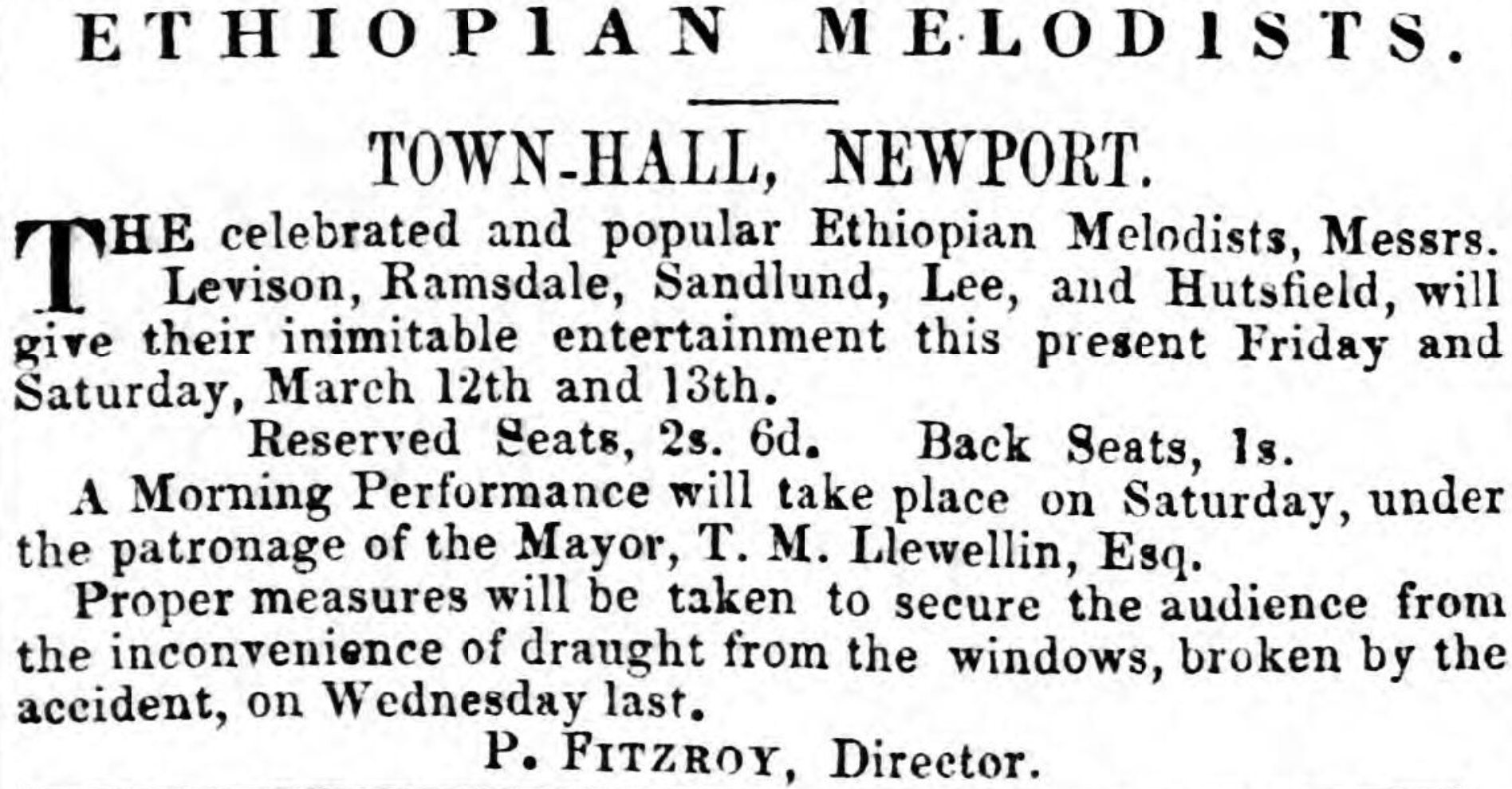
The Ethiopian Melodists would have been a touring troupe of blackface minstrel of which there were a number during the 1840s. Whilst not the same, this group from the US did tour Britain around the same time as this advert.
Like the last paragraph on the advert about protecting the audience from the draught due to a broken window.
— Monmouthshire Merlin, 13th March, 1847


Lady-Like Pursuits
The first prisoners placed at the bar this morning were Mary Joseph and Charlotte Jones, two Amazonian figures, of the usual slovenly appearance of Friars' Fields denizens, who stood charged with being caught in the act of fighting, creating a mob, and alarming the peaceful residents at the canal side, each staggering under her opponent's blows, and the head over-loaded with alcohol.
P. C. Bath detailed the proceedings that took place at the fight, and rendered a faithful portraiture of the melancholy exhibition of women under the influence of gin and Mr. Hopkins gave evidence with respect to the prisoners' mode of living, and the number of times they had appeared in this court. Mary Joseph two months, and Charlotte Jones one month, in the House of Correction.
— Monmouthshire Merlin, 29th May, 1841
Sunday Gambling
A young rascal called David Thomas, with fears in his eyes, and sobbing like a whipped truant, was placed at the bar charged with gambling on, last Sunday. P. C. Harlow proved the charge. Thomas stated that he was only a bystander, having no interest whatever in the game. He had picked up 3d. when the gamblers ran off on the approach of Harlow, certainly, because he thought it a pity to Jose so much of the Queen's copper coin. His parents resided near the Rodney Arms, and his father was a blacksmith. When asked by Mr. Phillips, he replied he had never seen the treadmill, nor ever wished to. The young urchin was severely reprimanded, and then discharged.
— Monmouthshire Merlin, 29th May, 1841
Garden Robbers
Thomas Rees was charged with a trespass on the premises of Mrs. Rebecca Harrhy. It appears that Mrs. Harrhy has suffered to a considerable extent by the depredations of a set of plundering scoundrels, who infest this town, and who, at this season of the year, are prowling about all night, ready to rob any garden where they think they may be able to carry off their booty without discovery.
— Monmouthshire Merlin, 30th July, 1842
Stealing a Spoon
Charlotte Kerman, a young woman, with an infant in her arms, was indicted for stealing a plated spoon, the property of Mrs. Allen, Bridge Inn, Newport, on the 8th of March. Mr. Barrett called and examined Mr. Superintendent Huxtable, who proved apprehending prisoner on the 8th or 9th of the month, when he demanded a spoon from her, which he said she was accused of offering for sale.
She gave him part of a spoon, after some hesitation, and said, on his inquiring, her little boy had picked it up but she knew nothing about the other part of the spoon.
He threatened to have her searched, when she took the remaining part from under her armpit.
The initials had been partially obliterated. Mrs. Allen identified the parts produced as forming one of her spoons, two or three of which she recently lost. Guilty. Five weeks' hard labour.
— Monmouthshire Merlin, 24th March, 1854

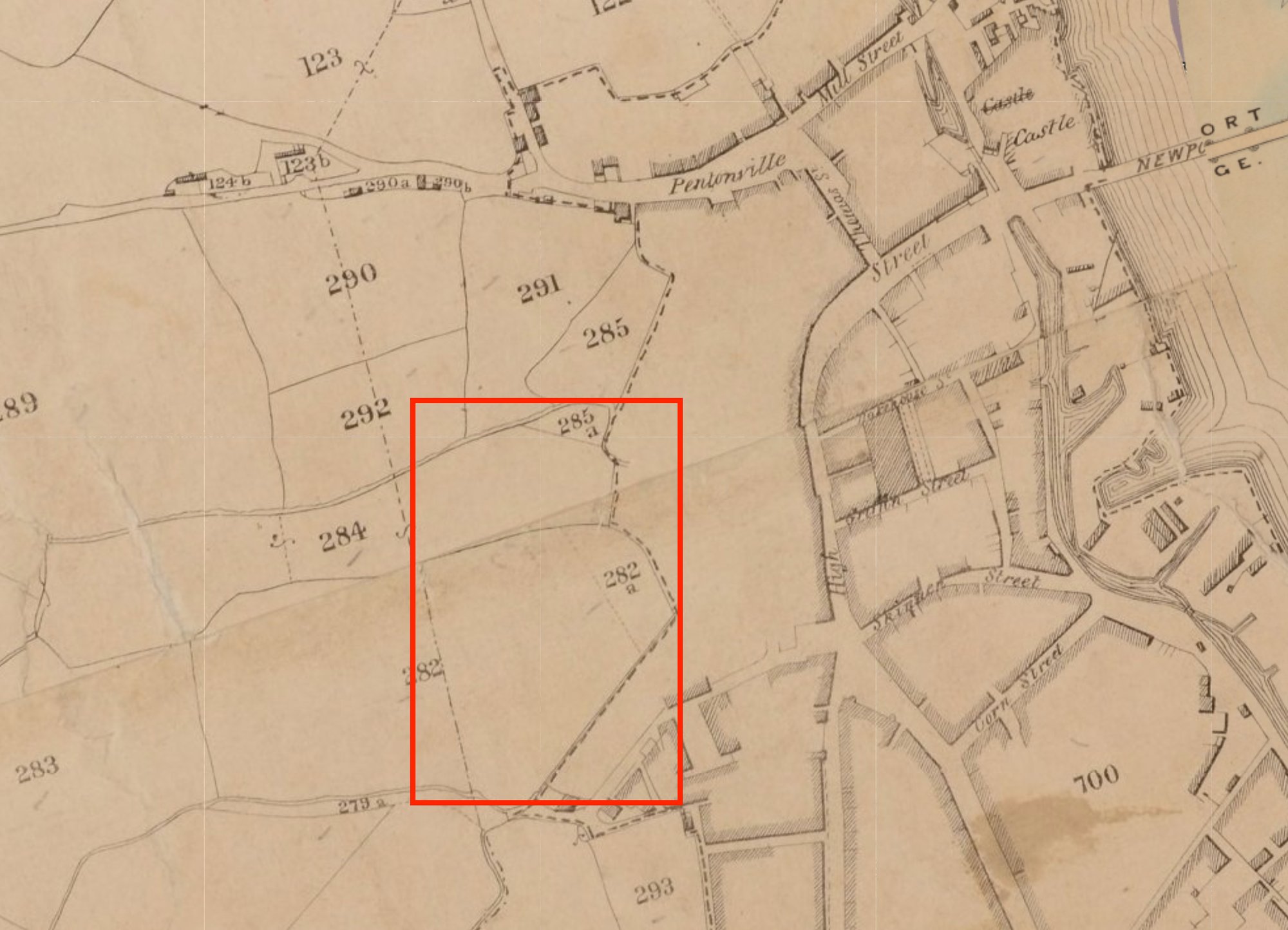
Mrs. Harrhy's garden was cleared of a large quantity of apples by some of these marauders on Thursday night, and Mr. James Harrhy, on the following night, hearing some noise in the back premises, went out and found the prisoner in the potato garden. The fellow had nothing upon him, but there is little doubt he is connected with the gang, which is likely to he broken up by the vigilance of the police, who are now keeping a sharp look-out after certain fellows who are suspected to be the perpetrators of these depredations, and who, if they should happen to be found in the neighbourhood of gardens, under suspicious circumstances, will find that they will be sharply dealt with. The prisoner was convicted under the Town Act, and sent to the treadmill for one month.
— Monmouthshire Merlin, 30th July, 1842

'For Sale: Cottage and and Warehouse Near the Court-y-Bella Machine'
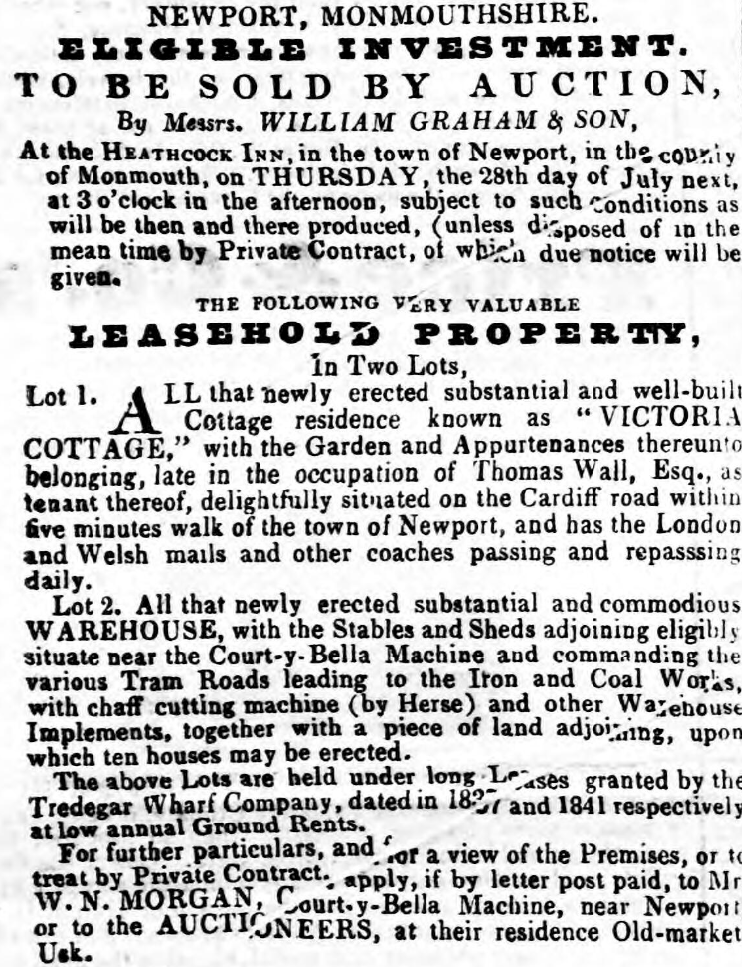
An advert published in the Monmouthshire Merlin in 1842 lists two properties for sale near the Court-y-Bella weighing machine. The first is for 'Victoria Cottage' complete with garden and 'appurtenances. It was delightfully located on Cardiff Road.
The second lot is for a warehouse with stables and sheds adjoining the iron and coal works tram roads. There was also land adjoining for up to 10 houses. The map below shows the likely location of the properties.
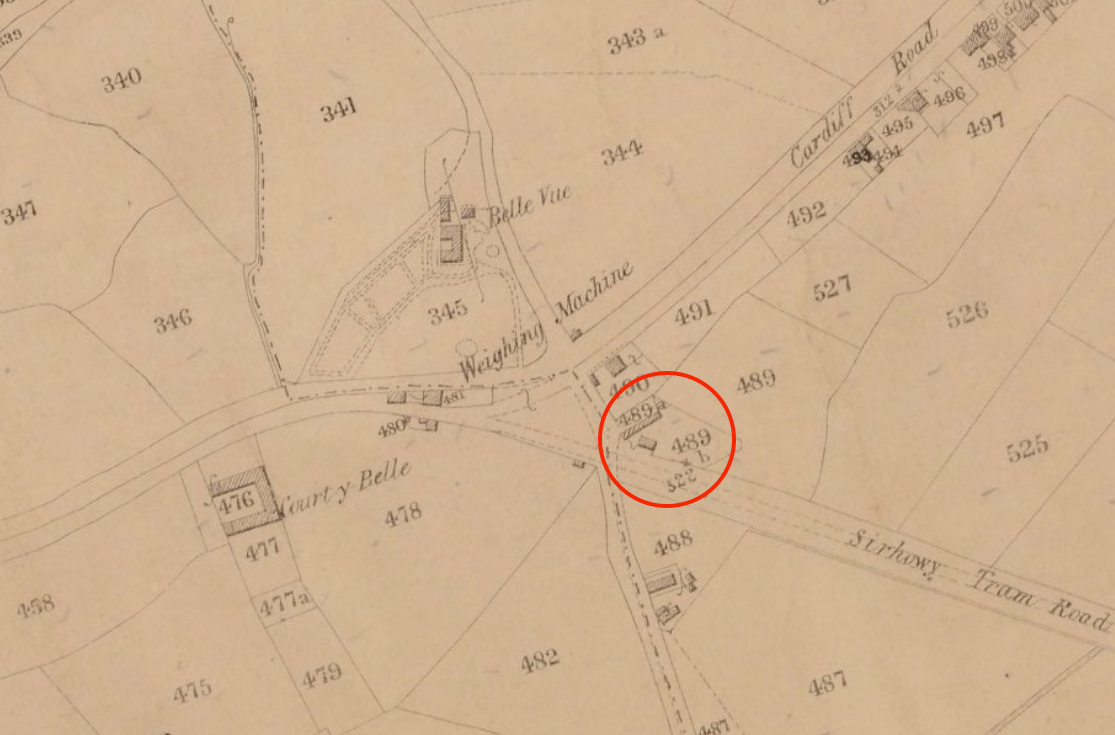

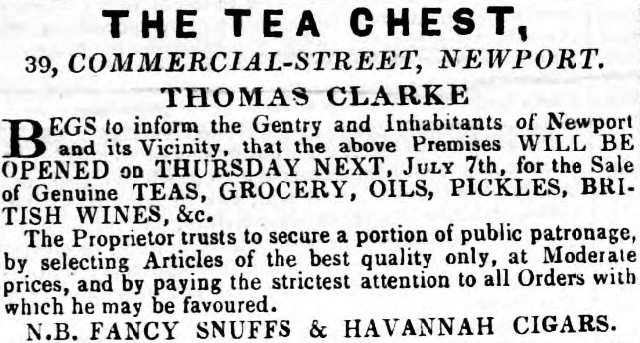

'Fighting in Pill'
To the Editor of the Monmouthshire Merlin.
Sir, Allow me, through the medium of your paper to state a few facts, and make a few enquiries.
Last Saturday night, at twelve o'clock, a fight commenced op- posne Mr. Evans, the chemist's house, at Pillgwenlly, and continued, without intermission, for about an hour, with such hooting, hallooing, and cursing, as it a set of demons had broken loose front the infernal regions, and were holding their saturnalia to disturb the calm quiet that should reign in the early hours of the Sabbath morning.
I have made some enquiries since, and have ascertained that a fighting fellow of the name of Will Richards, was one of the combatants; who the others were I do not know, but surely the Police might find them out, that they might meet with the punishment they so richly deserve; and now for a few questions.
Where were the police on Saturday night, that not one of them made his appearance on the spot for a whole hour? It appears strange; even if his beat extended for three miles, he surely should have arrived there once in the course ot that time. Verily, the good people of Pill have to pay dearly for protection, which they do not receive as their rest may be disturbed at the pleasure of a set of drunken vagabonds, who may fight even to the death, without the fear of a policeman before their eyes.
This grievance cries aloud for a remedy if the force is not sufficient for Newport and Pill, why not put on an extra man or two for Pill. A capital station might be made opposite Mr. Evans, the chemist's shop, where a wooden house now stands, and then a stop might be put to the nuisance.
I am sir, your obedient servant,
AMATOR PACIS. Pillgwenlly, March 2oth, 1847.
— Monmouthshire Merlin, 6th March, 1854

'For Sale: The Shipwreck Public House'
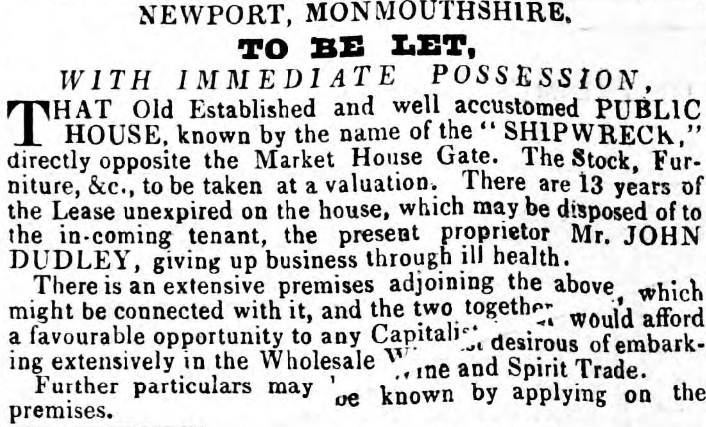
An advert was Monmouthshire Merlin, 2nd July, 1842 in July 1842 for a public house called the Shipwreck which was directly opposite the Market House Gate. According to a street directory from 1848, a pub called the Shipwreck was located at 8 Griffin Street which would place it on the high street end of Griffin Street.
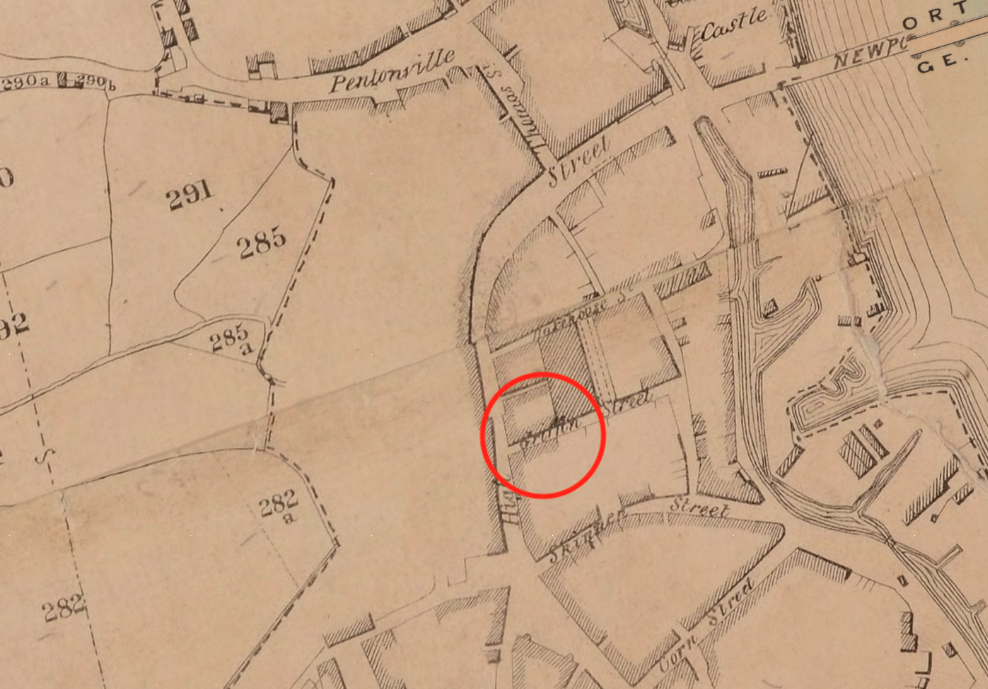

Newport an Open Station
We hear that on and after October 1st Newport will be an open station. For a long time past complaints have been made as to the inconvenience caused by persons who wish to go on the platform having to take tickets, and the Great Western Railway, London and North-Western, Brecon and Merthyr, or Pontypridd and Caerphilly trains. Upon the same date a similar alteration will be effected at Cardiff, and so the public will have free access to the platforms at each place.
— South Wales Argus, 7th September, 1896 (Subscription Required)

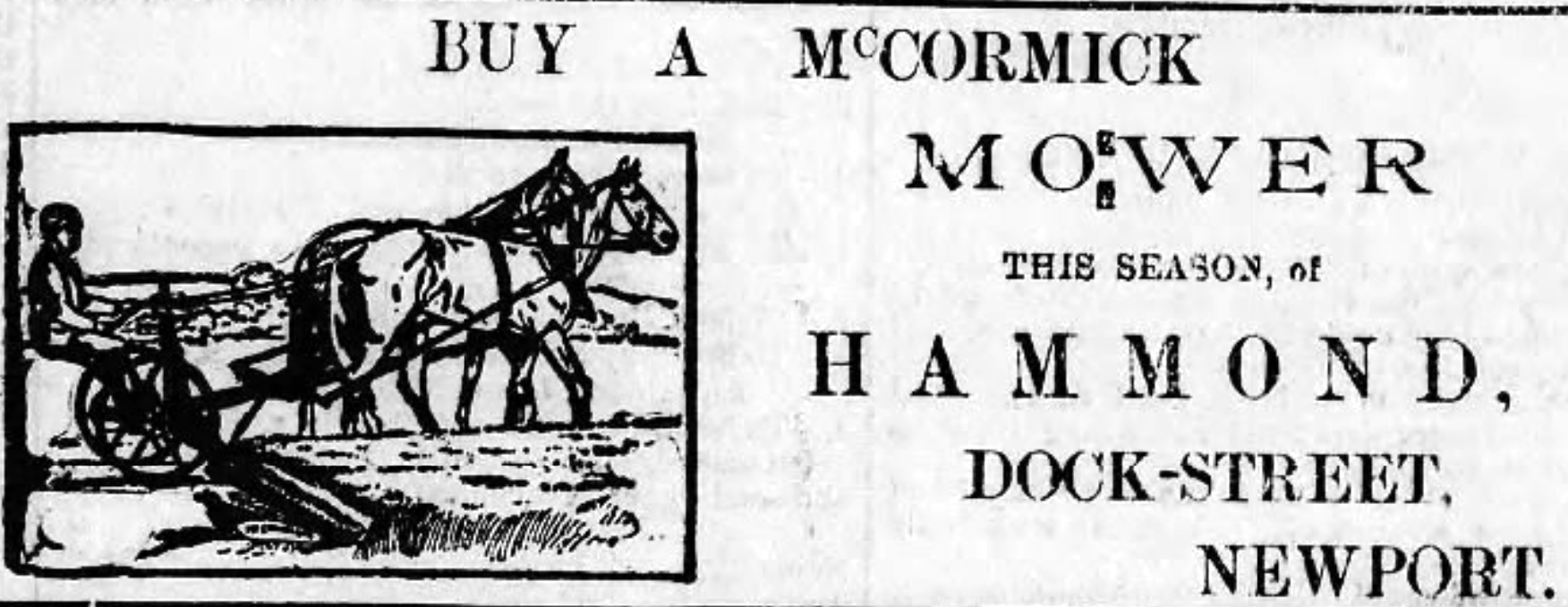
Risca "Pies"
We are informed that a species of revellings, well-known through Welsh localities as "pies," has been carried on at Risca, so very extensively, as to become a perfect nuisance in that neighbourhood. The "pie" is held at a beer-shop, where some twenty or thirty revellers keep up its bacchanal and gormandizing orgies from the Saturday night on which they are commenced, throughout all the ensuing week and then the "pye" is held at the next beer-shop, and so on to the end of the chapter till the last days of Autumn.
The police officer of the Risca district, Mr. John O'Brien, we understand, is fully authorised to put a stop to these proceedings, by bringing the parties keeping the houses at which those "pies" are opened, before the magistrates of that district, when, no doubt, exemplary penalties will be inflicted. It does not prove the assertion so frequently made, that there is very great distress in our neighbourhood, when we see men thus foolishly squandering their hard-earned money in this impious way.
— Monmouthshire Merlin, 13th August, 1842

"Neither weed nor grass will grow through it'


Trotting Match
On Tuesday last, a trotting match came off between a black pony belonging to Mr. John Gard, and a bay one belonging to Mr. John Taylor, of Goldclift. The match was made for ten pounds a-side, to carry thirteen stone nine, and to be ridden by the owners. The distance was twenty miles, and the ground chosen was from the first mile-stone on the Cardiff road, to the milestone at Roath, ten miles out, and home.
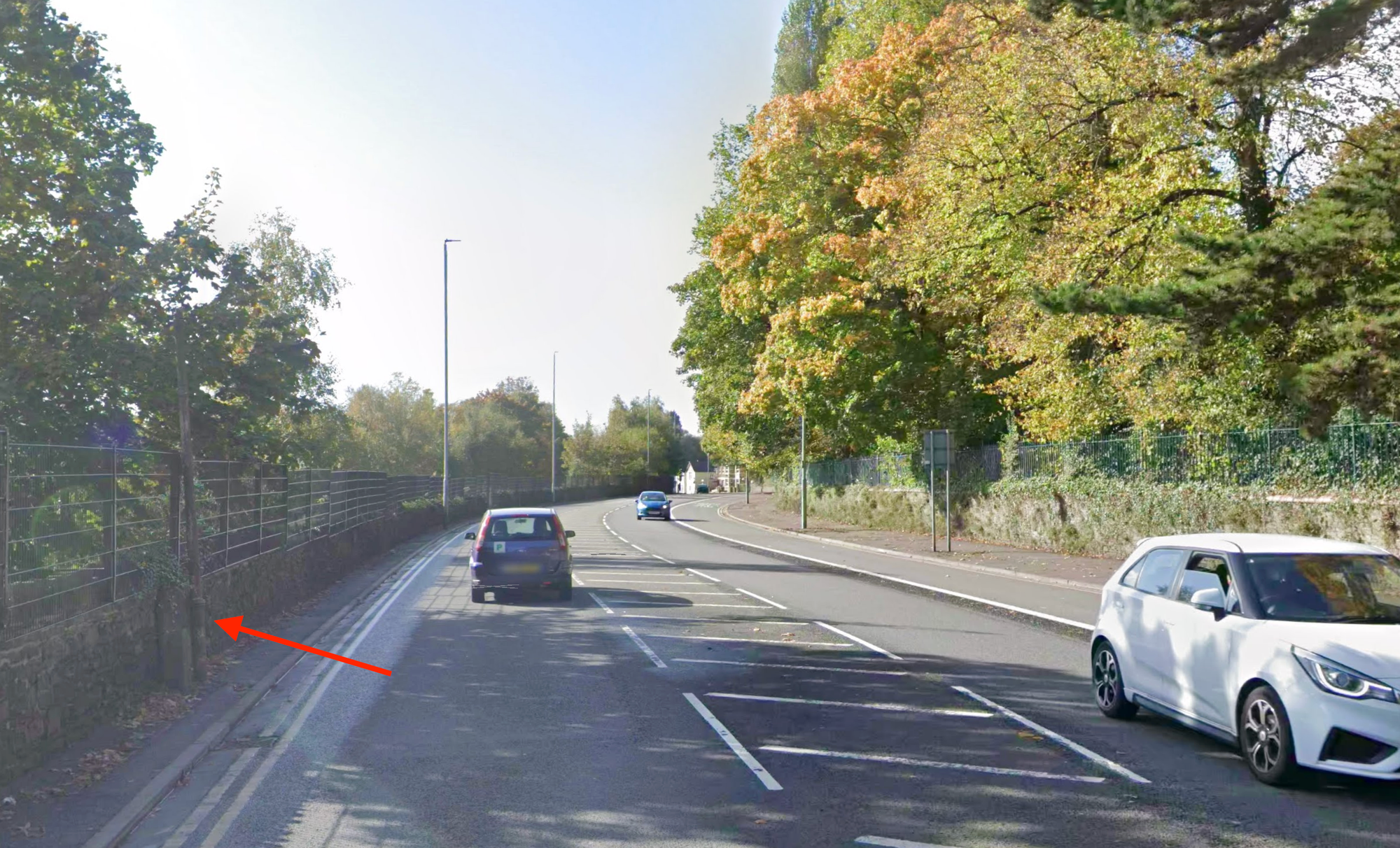
The start took place at ten o'clock, when the ponies went away together at a good pace, which increased as they passed Maes Glaes. They crossed Ebbw Bridge in fine style, Taylor being about a head in front, and on the flat piece through Tredegar Park it became very severe. They kept in this order to Castletown and on rising the pitch on the Cardiff side Taylor's pony showed symptoms of failing. Gard then let out his pony, and took the lead at a splitting pace, which he kept up to Roath, when it u as clear that the bay had no chance, and being soon after winded, and done up, Mr. Taylor gave in. Gard then went along at a moderate pace, and completed thirteen miles in fifty-seven minutes.
He walked up Rhymney Pitch, and stopped at Castletown for a few minutes; here a number of Newport folks had assembled, who loudly cheered him as he passed. He came on towards Newpolt at a good pace, reaching the winning post in one hour and thirty-eight minutes. Mr. Gard's pony is a thorough good one and well bred, he did the distance out in first rate style, and being then declared the winner, he took it easier on the way home. Mr. Taylor's pony is a fast one for a short distance, and is not a bad one of its kind, but it has not the bottom of the other, and cannot live with him for so great a distance as twenty miles He was backed freely at starting, all the sporting men from the Moors being very sweet on the bay. They have, however, dropped enough on this occasion to teach them that for a long match it is folly to put bone against blood.
— Monmouthshire Merlin, 20th August, 1842

Newport and Caerleon Mail
To the Editor of the Monmouthshire Merlin
Sir, Your correspondent, under the signature of "Despatch" has, in the conclusion of his letter, stated that the alteration of the route through Caerleon, of the Abergavenny Mail not injuriously affect Caerleon. Now, I am inclined to be charitable enough to suppose your correspondent knows nothing of Caerleon for he certainly would not assert that the removal of a conveyance from a respectable town, of eleven hundred inhabitants, and a neighbourhood of two hundred to four hundred more, would be attended with no inconvenience and it the convenience of the public, and the source of gain to the proprietors of the coach, be a matter of preference, Caerleon must claim it.
The reason given for the intended removal, is, that some petty eighteen or twenty pounds would be saved in the mileage, in the year; and I am confident, a representation of the inconvenience that would be sustained by her Majesty's loyal subjects of Caerleon, would soon remedy the matter, and Caerleon will retain its mail coach.
The coach starting one hour earlier, and even passing through Caerleon, will accomplish the desired object of "Despatch," without coveting his possessions; and judging that your correspondent is a good Churchman, I trust he will respect the Tcnth Commandment.
The recollections of what Caerleon once was — the seat of Kings, the British capital — should cause your contributors to pause, before they again attempt to rob us of our privileges.
Alas, alas! once could this ancient town boast of towers, baths, temples, theatres, statues, altars, columns; but all have passed aaway as a dream of the night, leaving but the slightest vestiges of its former greatness; and, to the contemplative, the melancholy truth of the instability of all sublunary greatness.
I am, Mr Editor,
Ever yours, faithfully, LEGION
Isca Silurum, August 16, 1842
— Monmouthshire Merlin, 20th August, 1842



Cornish Gold in Newport
A day or two since, numerous persons in this town were pleasingly reminded that there are El Dorados at home, as well as abroad. It has been a mania among all classes for some time, to be off to the Australian Diggings. Now, however, that there are "diggins" discovered to exist nearer our shops, our marts, and our habitations, the fever is subsiding—but only to be diverted into the home channel.
Mr. Thistleton who came to this town on a visit, brought with him from the Calstock Consols and Okel Tor mines, in Cornwall, two pieces of gold—the latter being worth £4 10s. per ounce; and the former £3 18s. This gold had been extracted from the "gossan," or refuse, of the mines named, and has been assayed by Professor Calvert, who states that 5 dwts. of gold to a ton of gossan, will pay well for the cost of crushing, extracting, &c.
The St. John del Rhea gold mine in Brazil produces 9 dwts, to the ton of "stuff;" and that mine is considered one of the richest of the gold class but the Calstock Consols and Okel Tor gossan, it appears, turns out a much larger quantity of the pure metal.
Several shares in these mines have been taken by parties in Newport, who are anxious to participate in the golden speculations of the day, without sacrificing every prospect at home, to obtain the glittering ore abroad. The mines named, are also turning out an abundance of copper and lead ore, with a mixture of silver in the latter.
— Monmouthshire Merlin, 17th March, 1854

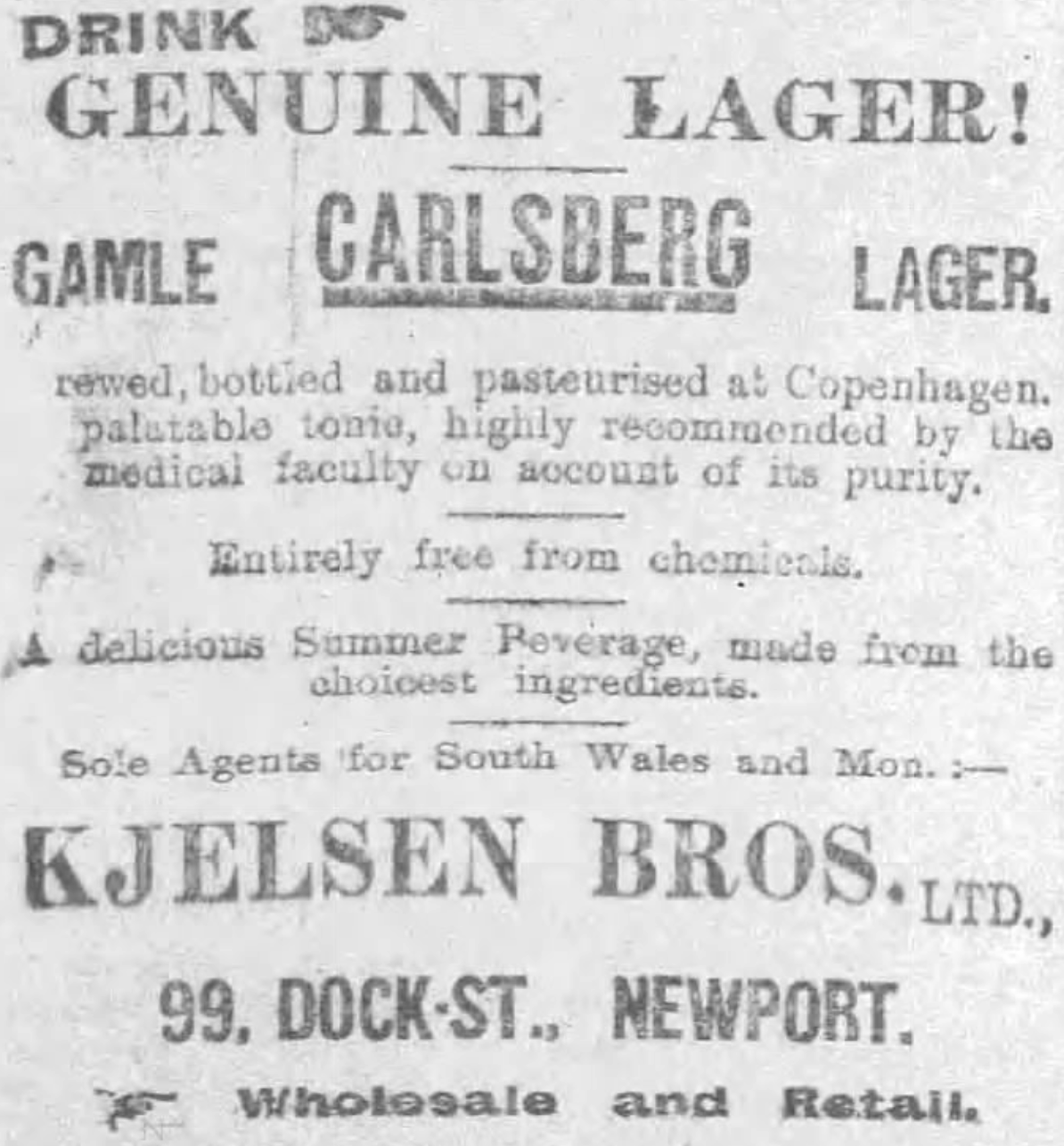

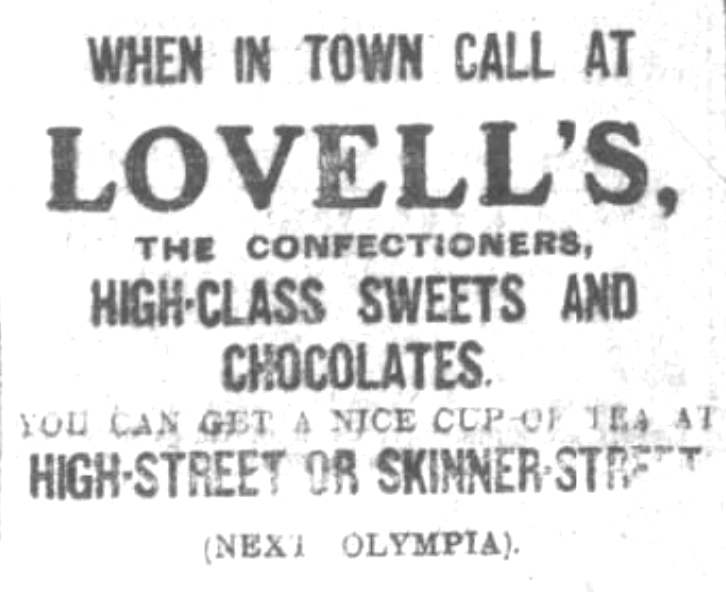
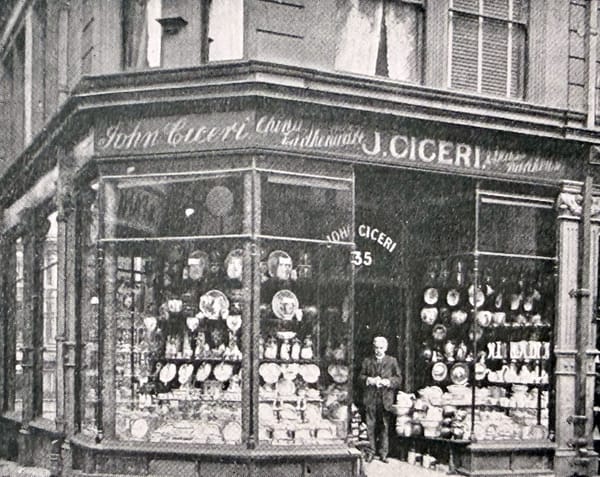
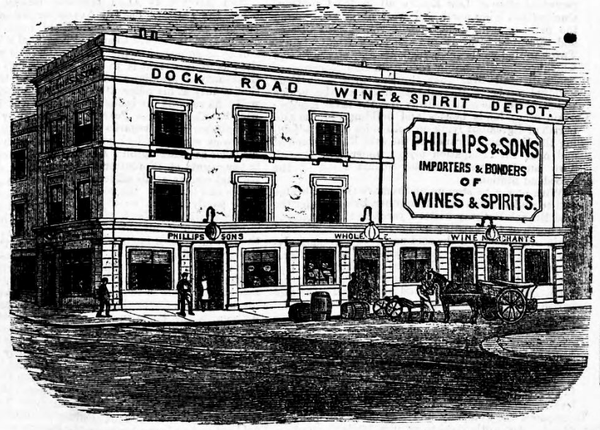
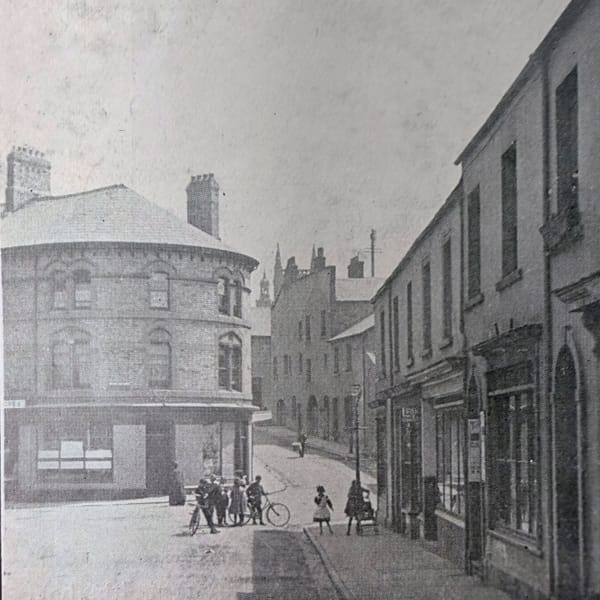
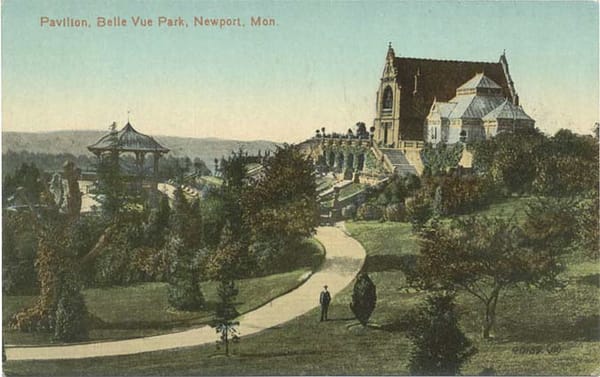
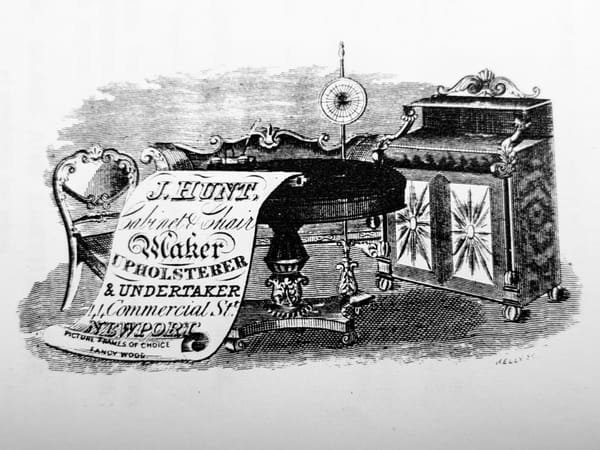
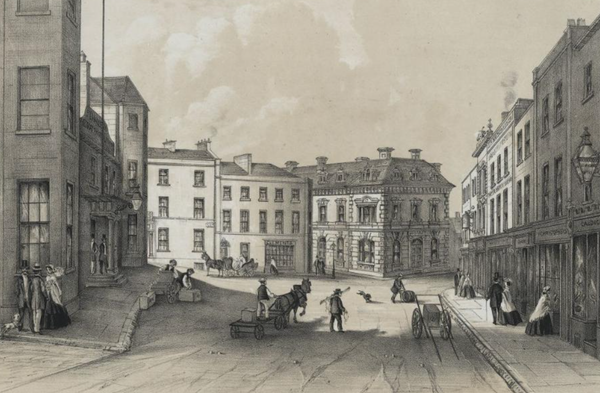
Member discussion